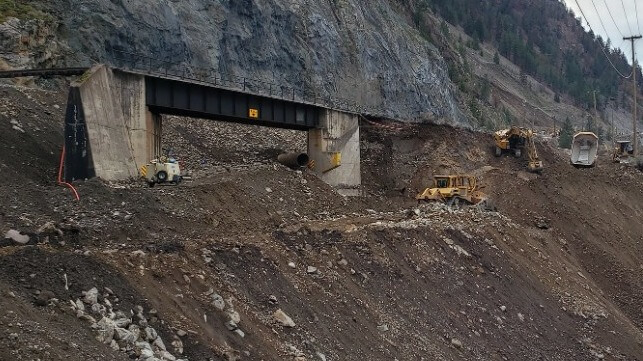Heavy Rain Delays Rail Service Restoration for Port of Vancouver

The Port of Vancouver, B.C. is still waiting for rail lines to restore full connectivity to markets in inland Canada, two weeks after an atmospheric river event flooded out the two main rail routes over the mountains to Alberta. Another round of rainfall began this week, and it has set back CN Rail's efforts to reopen its line from Vancouver to Kamloops, reversing an apparent success over the weekend.
"CN engineering teams continue to undertake repairs at a site impacted by heavy precipitation. A timeline for restored rail operations through the site is currently unavailable," the port said in an update. A parallel line operated by CP remains running, supported by ongoing maintenance and inspection work.
The impact of the next round of rainfall is not yet known, but the forecasts suggest the possibility of more flooding. Another atmospheric river began dumping rain on B.C. on Monday, and heavy rainfall is set to continue through Wednesday evening. Evacuation orders are in effect in selected low-lying areas, including parts of the towns of Abbotsford, Hope and other communities. In addition, the risk of new landslides has forced the closure of Highway 99, a key route across the mountains to the northeast.
We will continue to see moisture stream in from this Atmospheric River for another 24 hours. There are numerous weather warnings across the province, view them here: https://t.co/VIIGgUlXIo
— ECCC Weather British Columbia (@ECCCWeatherBC) November 30, 2021
Flood alerts: https://t.co/ARUaYHMx55
Stay informed & safe!#BCStorm #BCFloods pic.twitter.com/AUCGThh9nk
The disruption comes at a time of peak activity for cargo handling at the Port of Vancouver and other West Coast seaports. The demand for anchorage space currently exceeds capacity, according to the port. Anchorages are prioritized by port operations in order to keep cargo moving and balance the needs of different vessel classes.

that matters most
Get the latest maritime news delivered to your inbox daily.
In addition to port, highway and rail disruption, Vancouver is facing a fuel shortage because the Trans-Mountain Pipeline - which delivers Albertan crude oil to B.C. - has been shut since November 14 due to the impact of the torrential rains. Road access challenges have slowed down the attempt to restart the line. Instead, the province is receiving its fuel supplies by rail and by short-sea shipping from refiners in the U.S., and there may not be enough to go around. A fuel-rationing order limiting gas and diesel fill-ups to eight gallons per purchase is in effect through December 14.
It is the second time this year that the port has had its rail service interrupted by natural disasters, following the extreme wildfires that hit the province over the summer. In July, forest fires damaged portions of the two rail lines that connect Vancouver to eastern markets, disrupting train access to the Port of Vancouver for two weeks.
